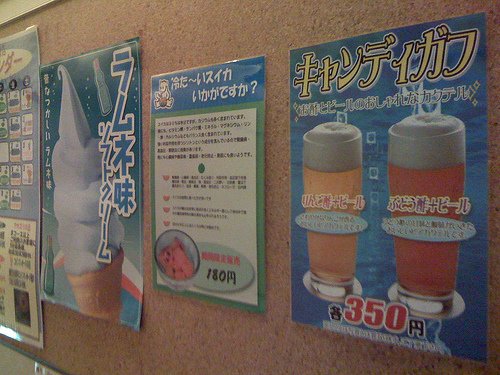You never know where the next interesting “boom” will come from in Japan. Maybe it’ll be a strange new fashion trend, like the Bob Marley craze a few summers ago when young Japanese thought they should dress in Jamaican colors, or the more recent Brit-Punk fashion trend inspired by the popularity of the manga Nana. (I’m hoping for the return of the heso-dashi summer, when all the cute girls wore half-shirts that showed their belly buttons.) Or maybe it’ll be a food-related explosion in popularity, like when everyone was lining up to buy Belgian Waffles, or this summer’s boom in mango-flavored foods of every type. With our house being renovated, I’ve been hitting the local onsen (hot spring public baths) pretty hard, and in one I happened across a poster advertising what might just be the next big thing: a cocktail of beer and delicious vinegar. There were two flavors for you to try, made with apple and grape vinegar, and both looked like they might actually be reasonably tasty, as far as those things go. Vinegar is considered quite healthy in Japan, and most mornings my wife presents me with a glass of diluted “black vinegar” (kurozu) made from unpolished rice, to reduce the acid content in my body, or something. Next to the Vinegar Beer was a poster advertising another new item: Ramune flavored “soft cream” (soft-serve ice cream), with the taste of that famous Japanese marble-in-a-bottle soft drink. Sounds delicious!

It’s August, and that means it’s time for another report on the High School Baseball Championship going on right now at Koshien (koh-she-en) Stadium near Osaka. High school baseball is really big in Japan, and teams from each of Japan’s 47 prefectures try all season long to win the right to go to the championships. To go to Koshien is the dream of every young ball player, and it has a positive effect on the future careers of thousands of young men every year, whether they go on to play professional baseball or not. The high school baseball championships are followed closely on TV and in Japan’s many sports-only newspapers (my father-in-law manages to read three of them every day), and fills a similar role as college sports in the U.S. The drama of a Koshien race is captured in manga and anime such as the classic Touch, a comic I used to study Japanese with while at SDSU. Thanks to one of the many bizarre coincendences that seem to happen only in Japan, the city I came to live in just happens to be the birthplace of Touch creator Mitsuru Adachi, and my wife has the same birthday as him — go figure. This year our prefecture is once again represented at Koshien by Maebashi Commercial High School (abbreviated “Maesho”), Adachi-sensei’s old alma mater (and also the school that our own Yasu graduated from). They’re doing well, too — if they win today’s game they’ll be in the top 8. Go, Maesho!
Before I started J-List, I did what many English-speaking foreigners before me have done, working as a teacher of English as a Second Language (ESL) and imparting my native language to students of all ages. Once thing I’ve noticed, at least when dealing with junior high and high school age students, is that they view English has having two sections that are only casually related. “English” is an important scholarly study, consisting of grammar, vocabulary and reading comprehension, and it’s needed to succeed in school and pass university entrance exams. This English is rather similar to mathematics, and there’s only way “correct” answer to any given question, one “right” way of translating a given paragraph. The touchy-feely “English conversation,” on the other hand, is optional, and only needed by Japanese who plan to live overseas or do a lot of traveling. Since the Japanese are so precise about their English, they take it for granted that all native speakers know every single English word ever, including complex medical terminology. They’re also mistrustful of native English-speaking teachers who can’t answer the question “why?” Why does this sentence need a gerund instead of an infinitive verb? Why do you say ‘on a ship’ when you’re actually inside it? Being a teacher in Japan really led me to come to understand my own language on a new level.















